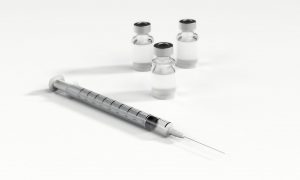On December 9, the United Kingdom became the first country to being administering a fully-tested, fully-approved vaccine for COVID-19. The vaccine, developed by Pfizer and BioNTech, showed 95 percent efficacy in trials. The vaccine is expected to be approved by the United States on December 10. Another vaccine, from Moderna and the U.S. National Institutes of Health, has reported 94.5 percent efficacy and is pushing toward approval as well.
Where do China’s vaccines stand?
China currently has four vaccines in advanced stages of development. The final stage of clinical trials, phase three, involves thousands of volunteers, both to monitor for side effects and to test the efficacy of the vaccine in a larger population. Chinese vaccine companies have partnered with foreign countries to conduct their trials, as the spread of COVID-19 is largely contained in China.
On December 9, the UAE reported that trials of the vaccine candidate from Sinopharm showed 86 percent efficacy. The UAE Ministry of Health also said that there were “no serious safety concerns” linked to the vaccine.
Following its analysis, the Middle Eastern state became the first country to officially approve the use of a Chinese vaccine – even beating out China. China has already been administering Sinopharm vaccines to its population – over 1 million people, so far – under emergency use guidelines, but has not yet granted final approval to any vaccine. The widespread roll-out of the vaccines, whether in China or abroad, needs to be backed by completed phase three data.
Another vaccine nearing the end of the process is Sinovac’s offering, known as CoronaVac. Earlier this week, Sinovac’s partner in Indonesia vaccine trials, PT Bio Farma, announced that the vaccine had proven 97 percent effective there. Sinovac, however, pushed back on that claim, with a spokesperson telling Bloomberg that its efficacy had not yet been determined. The spokesperson clarified that the vaccine resulted in the creation of antibodies in 97 percent of cases, but that does not necessarily imply 97 percent protection from contracting COVID-19.
Results from another phase three trial in Brazil are expected to be released by December 15, according to Sinovac’s partner there.
Notably, neither Sinopharm nor Sinovac have publicly released the data from their vaccine trials, making it difficult for independent experts to verify the claims. A vaccine under joint development by Oxford University and AstraZeneca came under question after its data revealed different doses were used in different trials.
Unlike the Pfizer and Moderna vaccines, which use a revolutionary mRNA technique, Sinovac and Sinopharm took a more traditional approach, using an inactive form of the virus to instigate an immune response. The method has the advantage of not requiring vaccines to be stored at temperatures well below freezing, which will make distribution easier from a logistical standpoint.
That’s good news for poorer countries, where keeping vaccines deep-frozen until just before their use might prove impossible. China has promised to make its COVID-19 vaccines available to developing countries as a “global public good,” particularly naming Pakistan along with countries in Southeast Asia and Africa as “priority” recipients.
As Chinese vaccines near approval, attention will turn to how quickly China can manufacture them and dole out doses as promised. Sinovac, for example, has said it can produce 300 million doses a year – enough to vaccinate 150 million people. China alone has a population of 1.4 billion, not to mention the people in other countries that have been promised access to Chinese vaccines.

































